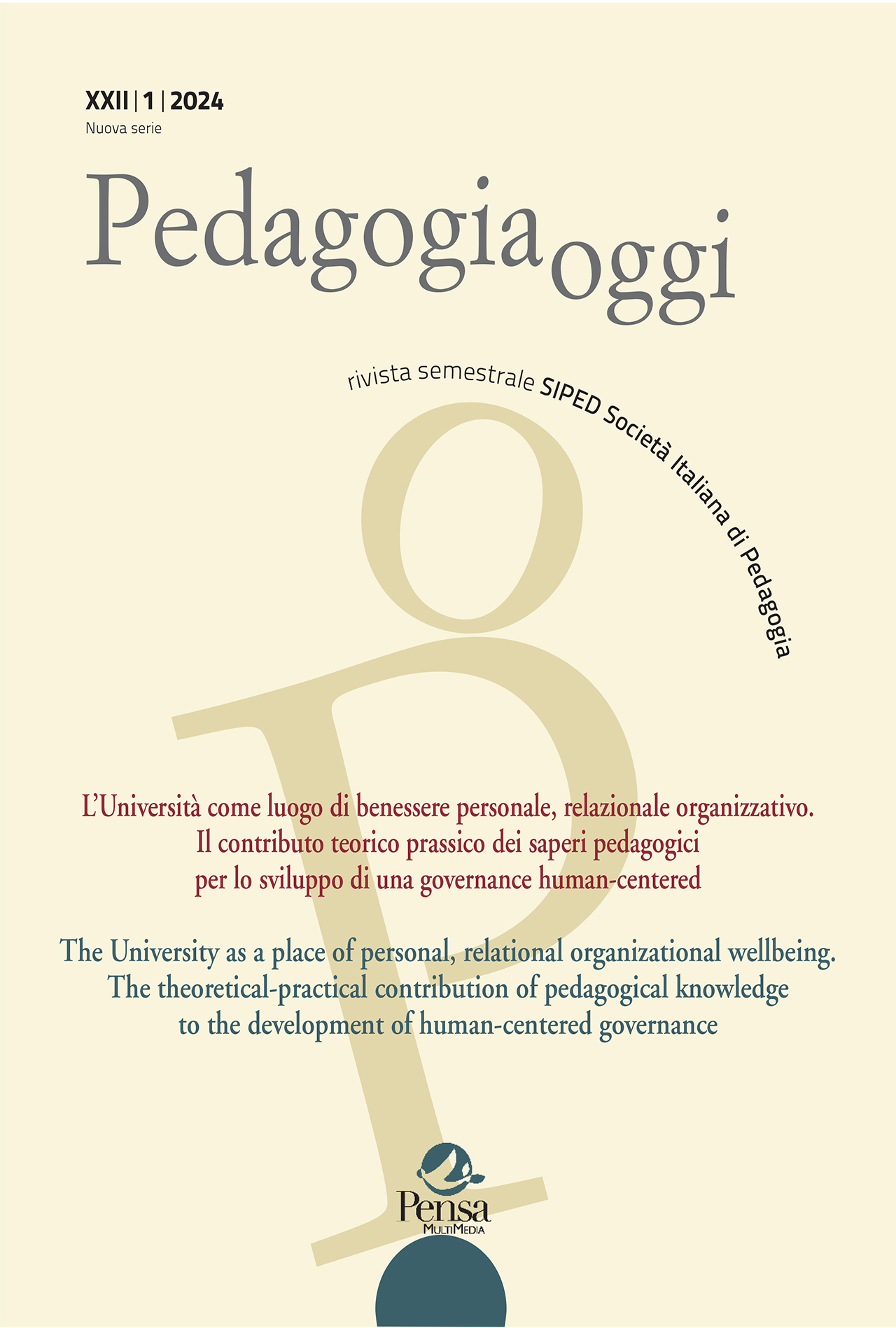Editoriale
DOI :
https://doi.org/10.7346/PO-012024-01Mots-clés :
EditorialeRésumé
Le finalità con cui i sistemi educativi e formativi formali accolgono i propri studenti cambiano radicalmente a seconda del grado di scuola e del tessuto culturale e organizzativo che opera sullo sfondo delle diverse realtà locali. Pur nell’ampia fenomenologia che ciascuno di tali sistemi interpreta c’è, tuttavia, il comune dovere etico e, anche, deontologico, di promuovere e al contempo salvaguardare e tutelare le condizioni perché si realizzino esperienze che, al di là dell’acquisizione dei saperi e delle professionalità, incrementino anche i livelli di benessere personale, comunitario e sociale. Negli ultimi anni, anche le Università sono state chiamate ad assumere un ruolo di primo piano nel corrispondere a questo compito che, beninteso, non si esaurisce nel solo successo formativo o nel solo miglioramento della re-lazione docente-studente, ma coinvolge tutte le funzioni che ne regolano la governance: dalle pari opportunità alla trasparenza, dalla mobilità al sostegno allo studio, dalla accoglienza all’orientamento ecc. Nel corso degli ultimi anni (decenni) l’Università ha, con buona pace di tutti, elaborato il superamento sia della propria identità di istituzione autoreferenziale sia della sua vocazione elitaria, sviluppando un profondo senso di responsabilità sociale e di impegno pubblico. Tuttavia, talvolta questo cambiamento epocale (il primo legato, tra l’altro, a effetti indotti dalle nuove epistemologie dei saperi, il secondo dalle innovazioni e trasformazioni sociali e culturali) non ha sempre corrisposto alla formazione di una adeguata cultura istituzionale e organizzativa e di un corrispondente habitus pedagogico e didattico che fosse in grado di rispondere ai nuovi bisogni, alle diverse aspettative ed esigenze di riconoscimento e cura. La mancanza di un basico e sistematico pensiero caring dell’istituzione universitaria si è talvolta tradotta in azioni (pure legittime dal punto di vista di una logica della relevance) progettate e programmate per intervenire per lo più compensativamente rispetto ai problemi che, di volta in volta, scoperchiano il vaso di pandora del malessere di chi la abita. Malessere per molti versi connesso al funzionamento di dispositivi orientati esclusivamente alla performance e spesso insensibili e disattenti alla singolarità, alle storie, ai bisogni, ai desideri, alle potenzialità e possibilità degli studenti, delle loro famiglie, dei docenti, del personale tecnico-amministrativo, del mondo del lavoro, dell’intero territorio ecc. Tuttavia, dal punto di vista pedagogico, un approccio compensativo difficilmente si dimostra efficace nel medio-lungo termine per accompagnare la necessaria trasformazione dell’intelligenza dell’istituzione universitaria, esponendo al rischio di incasellare e stigmatizzare le manifestazioni di malessere; incapsularle in un dispositivo che le cronicizza e normalizza, incrementare la loro visibilità sociale senza un reale impegno a ricercare a monte alternative rappresentazioni e strategie organizzative che possano inquadrare i problemi emergenti in una nuova ecologia di funzionamento che vada oltre la loro semplice gestione e ne promuova una alternativa risoluzione. In particolare, a partire da tali considerazioni il presente numero di Pedagogia Oggi intende avviare una riflessione sul ruolo che l’Università oggi può svolgere nella promozione di una cultura della formazione mai disgiunta dal benessere, nel ripensamento di modelli educativi e organizzativi che, improntati alla cura, salvaguardino la dimensione dell’humanitas delle persone e delle relazioni che la attraversano e che da essa promanano. Troppe le storie di abbandoni, fallimenti, vergogna, impotenza che negli ultimi anni sono state associate al vivere universitario che, al contrario, dovrebbe essere occasione di crescita, passaggio esistenziale in cui far fiorire intelligenze, passioni, progetti. E questo si traduce in invito alla militanza per una pedagogia che, tra impegno, dissenso e promozione di benessere, può ancora esercitare il suo generativo “potere” di ripensare l’istituzione universitaria come luogo e tempo in cui i soggetti possano costruire e negoziare senso e fare esperienza dell’accadere del nuovo, imparando il valore euristico dell’errore, la gioia del ricominciamento, la meravigliosa fatica della ideazione e della progettazione.
Téléchargements
Publié-e
Numéro
Rubrique
Licence
(c) Tous droits réservés Giuseppe Elia , Gabriella Seveso , Catia Giaconiù, Ira Vannini 2024

Cette œuvre est sous licence Creative Commons Attribution 4.0 International.




